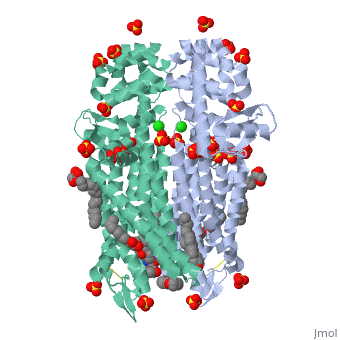We apologize for Proteopedia being slow to respond. For the past two years, a new implementation of Proteopedia has been being built. Soon, it will replace this 18-year old system. All existing content will be moved to the new system at a date that will be announced here.
4dkl
From Proteopedia
(Difference between revisions)
| (One intermediate revision not shown.) | |||
| Line 4: | Line 4: | ||
== Structural highlights == | == Structural highlights == | ||
<table><tr><td colspan='2'>[[4dkl]] is a 1 chain structure with sequence from [https://en.wikipedia.org/wiki/Escherichia_virus_T4 Escherichia virus T4] and [https://en.wikipedia.org/wiki/Mus_musculus Mus musculus]. Full crystallographic information is available from [http://oca.weizmann.ac.il/oca-bin/ocashort?id=4DKL OCA]. For a <b>guided tour on the structure components</b> use [https://proteopedia.org/fgij/fg.htm?mol=4DKL FirstGlance]. <br> | <table><tr><td colspan='2'>[[4dkl]] is a 1 chain structure with sequence from [https://en.wikipedia.org/wiki/Escherichia_virus_T4 Escherichia virus T4] and [https://en.wikipedia.org/wiki/Mus_musculus Mus musculus]. Full crystallographic information is available from [http://oca.weizmann.ac.il/oca-bin/ocashort?id=4DKL OCA]. For a <b>guided tour on the structure components</b> use [https://proteopedia.org/fgij/fg.htm?mol=4DKL FirstGlance]. <br> | ||
| - | </td></tr><tr id='ligand'><td class="sblockLbl"><b>[[Ligand|Ligands:]]</b></td><td class="sblockDat" id="ligandDat"><scene name='pdbligand=1PE:PENTAETHYLENE+GLYCOL'>1PE</scene>, <scene name='pdbligand=BF0:METHYL+4-{[(5BETA,6ALPHA)-17-(CYCLOPROPYLMETHYL)-3,14-DIHYDROXY-4,5-EPOXYMORPHINAN-6-YL]AMINO}-4-OXOBUTANOATE'>BF0</scene>, <scene name='pdbligand=CL:CHLORIDE+ION'>CL</scene>, <scene name='pdbligand=CLR:CHOLESTEROL'>CLR</scene>, <scene name='pdbligand=MPG:[(Z)-OCTADEC-9-ENYL]+(2R)-2,3-BIS(OXIDANYL)PROPANOATE'>MPG</scene>, <scene name='pdbligand=SO4:SULFATE+ION'>SO4</scene></td></tr> | + | </td></tr><tr id='method'><td class="sblockLbl"><b>[[Empirical_models|Method:]]</b></td><td class="sblockDat" id="methodDat">X-ray diffraction, [[Resolution|Resolution]] 2.8Å</td></tr> |
| + | <tr id='ligand'><td class="sblockLbl"><b>[[Ligand|Ligands:]]</b></td><td class="sblockDat" id="ligandDat"><scene name='pdbligand=1PE:PENTAETHYLENE+GLYCOL'>1PE</scene>, <scene name='pdbligand=BF0:METHYL+4-{[(5BETA,6ALPHA)-17-(CYCLOPROPYLMETHYL)-3,14-DIHYDROXY-4,5-EPOXYMORPHINAN-6-YL]AMINO}-4-OXOBUTANOATE'>BF0</scene>, <scene name='pdbligand=CL:CHLORIDE+ION'>CL</scene>, <scene name='pdbligand=CLR:CHOLESTEROL'>CLR</scene>, <scene name='pdbligand=MPG:[(Z)-OCTADEC-9-ENYL]+(2R)-2,3-BIS(OXIDANYL)PROPANOATE'>MPG</scene>, <scene name='pdbligand=SO4:SULFATE+ION'>SO4</scene></td></tr> | ||
<tr id='resources'><td class="sblockLbl"><b>Resources:</b></td><td class="sblockDat"><span class='plainlinks'>[https://proteopedia.org/fgij/fg.htm?mol=4dkl FirstGlance], [http://oca.weizmann.ac.il/oca-bin/ocaids?id=4dkl OCA], [https://pdbe.org/4dkl PDBe], [https://www.rcsb.org/pdb/explore.do?structureId=4dkl RCSB], [https://www.ebi.ac.uk/pdbsum/4dkl PDBsum], [https://prosat.h-its.org/prosat/prosatexe?pdbcode=4dkl ProSAT]</span></td></tr> | <tr id='resources'><td class="sblockLbl"><b>Resources:</b></td><td class="sblockDat"><span class='plainlinks'>[https://proteopedia.org/fgij/fg.htm?mol=4dkl FirstGlance], [http://oca.weizmann.ac.il/oca-bin/ocaids?id=4dkl OCA], [https://pdbe.org/4dkl PDBe], [https://www.rcsb.org/pdb/explore.do?structureId=4dkl RCSB], [https://www.ebi.ac.uk/pdbsum/4dkl PDBsum], [https://prosat.h-its.org/prosat/prosatexe?pdbcode=4dkl ProSAT]</span></td></tr> | ||
</table> | </table> | ||
== Function == | == Function == | ||
| - | + | [https://www.uniprot.org/uniprot/OPRM_MOUSE OPRM_MOUSE] Receptor for endogenous opioids such as beta-endorphin and endomorphin. Agonist binding to the receptor induces coupling to an inactive GDP-bound heterotrimeric G-protein complex and subsequent exchange of GDP for GTP in the G-protein alpha subunit leading to dissociation of the G-protein complex with the free GTP-bound G-protein alpha and the G-protein beta-gamma dimer activating downstream cellular effectors. The agonist- and cell type-specific activity is predominantly coupled to pertussis toxin-sensitive G(i) and G(o) G alpha proteins, GNAI1, GNAI2, GNAI3 and GNAO1 isoforms Alpha-1 and Alpha-2, and to a lesser extend to pertussis toxin-insensitive G alpha proteins GNAZ and GNA15. They mediate an array of downstream cellular responses, including inhibition of adenylate cyclase activity and both N-type and L-type calcium channels, activation of inward rectifying potassium channels, mitogen-activated protein kinase (MAPK), phospholipase C (PLC), phosphoinositide/protein kinase (PKC), phosphoinositide 3-kinase (PI3K) and regulation of NF-kappa-B. Also couples to adenylate cyclase stimulatory G alpha proteins. The selective temporal coupling to G-proteins and subsequent signaling can be regulated by RGSZ proteins, such as RGS9, RGS17 and RGS4. Phosphorylation by members of the GPRK subfamily of Ser/Thr protein kinases and association with beta-arrestins is involved in short-term receptor desensitization. Beta-arrestins associate with the GPRK-phosphorylated receptor and uncouple it from the G-protein thus terminating signal transduction. The phosphorylated receptor is internalized through endocytosis via clathrin-coated pits which involves beta-arrestins. The activation of the ERK pathway occurs either in a G-protein-dependent or a beta-arrestin-dependent manner and is regulated by agonist-specific receptor phosphorylation. Acts as a class A G-protein coupled receptor (GPCR) which dissociates from beta-arrestin at or near the plasma membrane and undergoes rapid recycling. Receptor down-regulation pathways are varying with the agonist and occur dependent or independent of G-protein coupling. Endogenous ligands induce rapid desensitization, endocytosis and recycling. Heterooligomerization with other GPCRs can modulate agonist binding, signaling and trafficking properties. Involved in neurogenesis. Isoform 9 is involved in morphine-induced scratching and seems to cross-activate GRPR in response to morphine.<ref>PMID:10842167</ref> <ref>PMID:16682964</ref> <ref>PMID:21422164</ref> <ref>PMID:22437502</ref> <ref>PMID:7797593</ref> <ref>PMID:9037090</ref> [https://www.uniprot.org/uniprot/ENLYS_BPT4 ENLYS_BPT4] Endolysin with lysozyme activity that degrades host peptidoglycans and participates with the holin and spanin proteins in the sequential events which lead to the programmed host cell lysis releasing the mature viral particles. Once the holin has permeabilized the host cell membrane, the endolysin can reach the periplasm and break down the peptidoglycan layer.<ref>PMID:22389108</ref> | |
<div style="background-color:#fffaf0;"> | <div style="background-color:#fffaf0;"> | ||
== Publication Abstract from PubMed == | == Publication Abstract from PubMed == | ||
Current revision
Crystal structure of the mu-opioid receptor bound to a morphinan antagonist
| |||||||||||
Categories: Escherichia virus T4 | Large Structures | Mus musculus | Granier S | Kobilka BK | Kobilka TS | Kruse AC | Manglik A | Mathiesen JM | Pardo L | Sunahara RK | Thian FS | Weis WI

